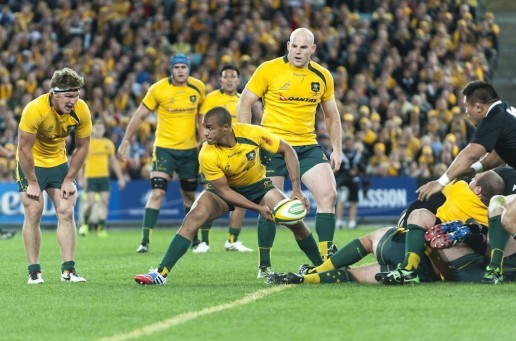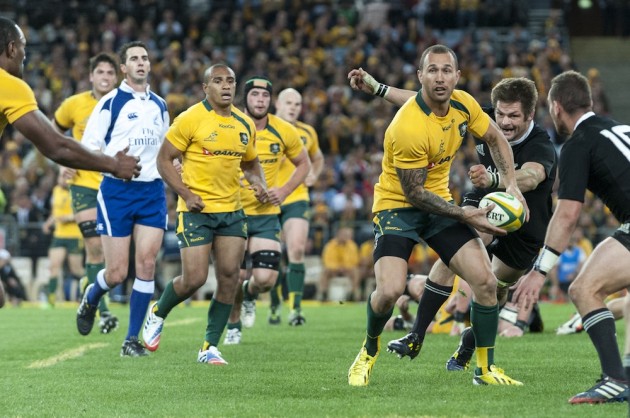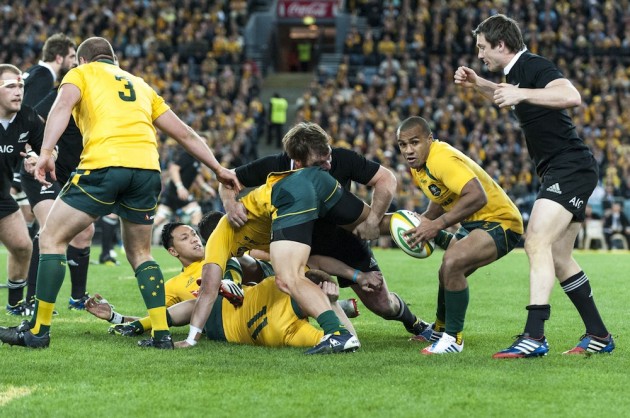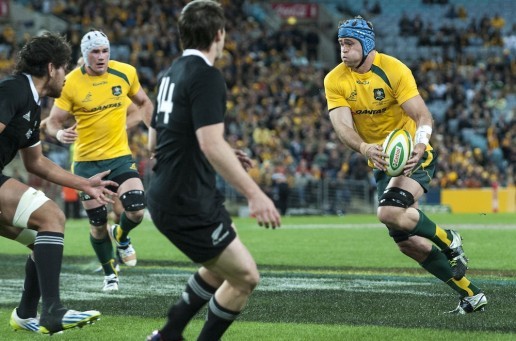The Wallabies were much better in this third Bledisloe and if we executed accurately the same things we did do – we could have been ENORMOUSLY better.
We’re heading in the right direction, but as usual people are saying ‘we just need to cut out the errors’. My question is: what do we actually need to do in our preparations to make sure we don’t make these mistakes in matches?
My key coaching philosophy is that practice doesn’t make perfect, only perfect practice does. It requires –
1 – attention to detail
2 – a fair bit of ticker to consistently correct the less than perfect practice.
It’s my observation (and I don’t know if this is the case with the Wallabies per se) that many coaches don’t call imperfections because for whatever reason they don’t feel they can’t consistently correct poor work. I’m not sure why this is – I can only think that either they feel insecure for their role, or of their analysis.
My personal approach was to never let anything go. Not to stop practice, but to consistently and constantly correct imperfect practice. If you talk to any of the players I coached, they’ll tell stories of it!
I was once reminded by a player – a gifted winger called Barry who didn’t play for the Wallabies, but had the talent – who remembered hearing me yell, “’Straighten Barry……straighten…….straighten…….F*CK YOU BARRY!’
If there is another way to do things that works, I don’t know it. So if we keep winding up saying we need to ‘cut out the errors’, it says to me our practice is not up to standard. We not only have to work harder, but more accurately.
But if we can play this well against a team that is clearly the best in the world by some standard, while missing some big names, we could go places. There’s no reason why we can’t get up the world ladder quite quickly.
So why are we playing better?
First, we didn’t kick much, at all. By doing this we give ourselves maximum opportunities to put pressure on defences if we execute well. Most of the time Quade Cooper took the ball flat – that caused our attack to ask questions of the defence; whether he went himself, put the ball back inside or pushed the ball wider.
Once again Quade was a significant player in our performance. Not that he was perfect, by a long shot. Quite a few times he took and passed the ball standing still, asking no questions of the defence and allowed the defence to drift onto outside attackers.
Matt Toomua was direct and has good footwork and threatens on the inside shoulder. Tevita Kuridrani was direct and physical so he threatens, forcing the defence to come one on one. Adam Ashley-Cooper was direct and threatens on the inside or outside shoulder.
The next thing I asked is ‘when were we successful?’ We were successful when we got to or over the advantage line. When we got quick recycle. When we got quick re-use and and advance of the recycle ball.
We therefore need to figure out what we need to do to increase these three areas and it was in them that we fell down far too often. And when we fell down, we not only missed our own opportunities, but gave them to New Zealand by losing the ball on the ground, or giving away a penalty or lost it in the tackle or got driven backwards.
So those three things we need to try and do all the time. But here are a few things I noticed that stopped us from doing that.
First, we had a distinct lack of physicality with our ball running – apart from those three listed above. Our backs on backs are OK, but when our forwards run at theirs we have a distinct lack of physicality in our carry. Twice, early in the game, James Slipper had the ball taken right off him! He’s a prop – they’re supposed to be quite compact and strong.
In the sixth minute of the game, winger Savea drove a prop – again James Slipper – off the ball. That was just an example of our massive shortcomings. We have a virtual absence of body position in contact: we are too high and too rounded in our back. We need to be low with our back hollowed and strong and use leg drive.
So in that one on one physical battle we were seen off 90% of the time, if I do us a favour. This is a really big problem for us. If think about one of the great old coaches, Dave Brokhoff, he would be horrified at the lack of body position and lef drive in contact.
All the time I keep thinking – were weren’t too bad – how much better could we be?
Our threatening the advantage line becomes difficult once we get away from our midfield running one on one against theirs. Most people thinks Will Genia is playing much better. He is, but that’s because he was playing so badly before. He is really only playing averagely well. Will rarely clears the ball perfectly.
He’s improved from where he was a few weeks ago, but I made note of where he cleared the ball well and in the 16th minute he did it very well for Quade Cooper’s drop goal – that’s the way it should be all the time.
He wasn’t bad in the 38th and 39th minute with two clearances leading to Adam Ashley Cooper’s try.
In the 73rd and 75th minute, both from lineouts and from subsequent phase play the clearances were passable, but not perfect.
But then when we go to the 80th minute you see an example where he is under maximum pressure and he gets the ball away instantaneously off the ground. He needs to do that all the time, when he’s not under such pressure!

Every time Will picks up the ball, juggles it like he’s feeling the weight of the ball and takes the sideways step, that gives the opposition another metre and takes that metre from us on the advantage line. It’s vital stuff. Vital.
That taking the ball static by Quade – is that Will not accurately putting it in front of Quade or Quade not wanting it that way? Either way it needs to change – hit it flat and go forward. When Cooper does it makes a massive difference to our game.
Second, if we are to have a quick recycle and re-use of the ball we need accurate support play and accurate and urgent realignment. In both of facets of play we are not up to standard.
If we look at the instances of the game when there is a complete New Zealand backline – sometimes there are up to 8 players, in a line, not too far apart and not in a zig zag so that everyone can move onto the ball and pass. Looking at those tries where the All Blacks took it left and then right to score tries, you see this.
This is what realignment means and we don’t do that. Sometimes the man passing the ball has to thread the ball between players – who are too deep or too flat – to find his runner. That’s not good enough.
It seemed to me that for the most part (with notable few exceptions) we were one-paced. At times we were even ponderous. If you look at Cruden’s try and look at our defenders covering on the inside to push the runners to the outside, we were ponderous. The Kiwis were scoring tries with three of four men to spare with no defenders. Our realignment in defence and support on the inside of the attacking ball carrier and giving the confidence is to push wider earlier is barely existent.
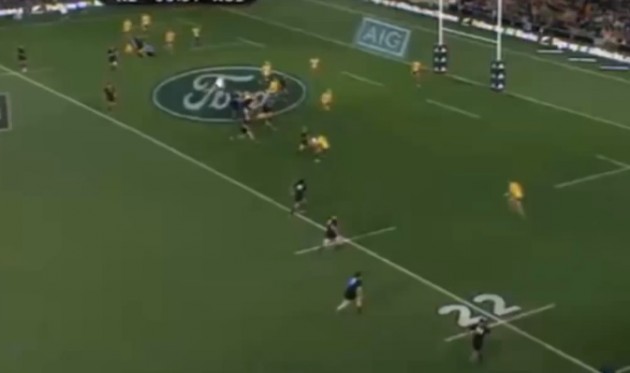
There are some people who work hard. Hooper works really hard, the other two back rowers work hard. Simmons also work hard.
So I thought our urgency and agility in attack and defence was really bad. Even though we thought we got close, it was more that they got far enough ahead to then ease off for us to come back and then to go away again.
Next, we have pretty ordinary ball skills. We drop the ball far too often because our technique of support is inaccurate. If the person next to you is about to receive the ball, your hands have to be up to catch the ball. You can’t run with your arms pumping and catch the ball. We’re running with our arms, the ball is on it’s way to us, and we’re still not ready to catch it. Remember Horwill and Kuridrani’s drops as examples.
Then there’s our defence – it is dreadful. We have no leg drive or body position in contact. Heaps of our tackles are just dragging men to ground. The New Zealanders were shoulder in, legs driving, going over the ball. We get a kick out of it when Timani comes on to make a decent hit.
Not only is the tackling woeful, so is the positioning. For the cross-kick try – why is our winger so tight and so flat? To have four people in a flat line so close together – I don’t understand it at all, neither the logic nor the necessity. How many times in the last half dozen games have we been outflanked – where the winger gets the ball with no cover?
I’m very worried about James Horwill’s performances. I don’t think he’s been the same since he was first injured 3-4 years ago. I cannot believe his lack of performance last Saturday. I sent in a text to a friend that I don’t think he did one thing positive for the Wallabies in the entire game. I can’t remember a game when someone’s made so little contribution. Even when I was critical of Higginbotham, he at least made some contribution.
I can’t even remember him taking a lineout throw. Surely this is totally unsatisfactory? Maybe he’s just not well or injured and maybe he thought with the circumstances he just had to play. But either way we’ve got to have an explanation. We can’t have a game like that, especially not from the captain.
One thing’s interesting – we’ve got at least four international standard fly halves in Cooper, Lealiifano, Toomua and Foley. New Zealand also does, but you don’t see them all in the same team at the same time. I’d still like to see Kuridrani at 12, Ashley-Cooper at 13, Folau on the wing and Beale at Fullback (I also think you could play Beale or Folau at outside centre).
People might then say we need a ball player at inside centre. Well I haven’t seen an Australian inside centre do any distribution for six or eight years – so I don’t see why we need one there, because we never use one! Just a couple of practise sessions would sort out Kuridrani’s play at inside centre.
So there you have it, I’ve been highly critical when we’ve scored three tries and perhaps racked up our highest score ever in New Zealand. Well, I’m not talking about how well we did, I’m talking about how well we COULD do. It can be A LOT better and I look forward to seeing it so.

